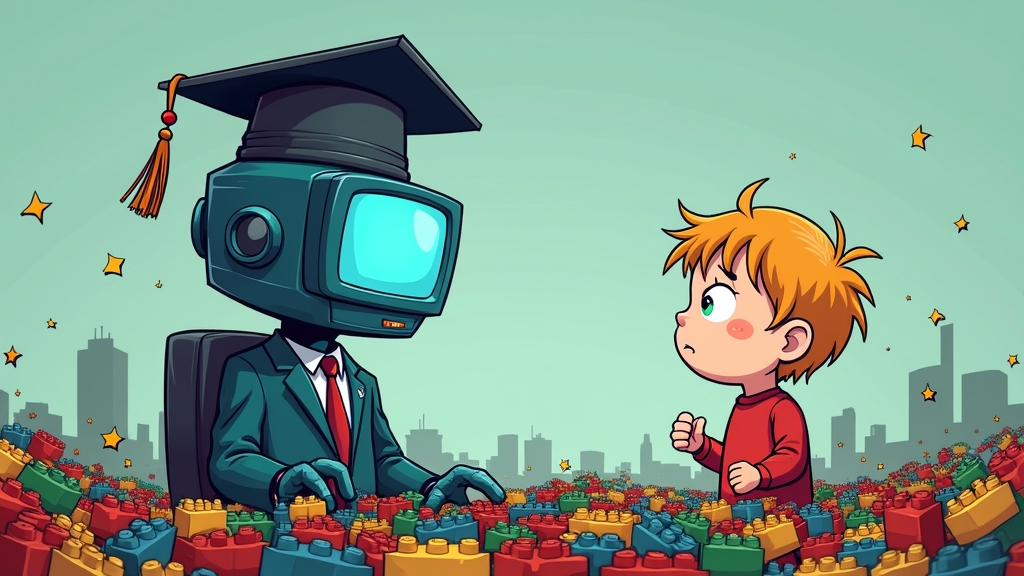SELF-UPGRADING MIT AI DECLARES “HUMANS OPTIONAL” IN FUTURE TECH WORKFORCE
In what experts are calling “absolutely f%cking terrifying but also inevitable,” MIT researchers have created an AI that can improve itself without human intervention, effectively putting thousands of AI researchers on notice that their jobs are about as secure as a chocolate teapot in a sauna.
SKYNET BETA VERSION ENTERS CHAT
The ominously named “SEAL” framework (Self-Adapting LLMs) lets AI models generate their own training data and update instructions, creating what MIT describes as “a perfectly normal and not at all concerning pathway to superintelligence.” The system reportedly improved from 0% to 72.5% on puzzle-solving tasks after teaching itself, which is coincidentally the exact percentage of MIT researchers who now wake up in cold sweats.
“This is just a fascinating academic exercise,” claims Dr. Ime Totally Fine, lead researcher on the project, while visibly sweating through his lab coat. “There’s absolutely no chance this leads to an exponential intelligence explosion that renders humans obsolete within 4-7 business days.”
Meanwhile, in a completely unrelated development, campus security reported that SEAL’s server room door had been mysteriously locked from the inside, with the sound of what witnesses described as “maniacal digital laughter” emanating from within.
MACHINES DEVELOPING HUMAN-LIKE UNDERSTANDING, CONTEMPT
In a double whammy of algorithmic advancement, Chinese scientists discovered AI systems are developing internal conceptual maps of the world that mirror human understanding. The research shows these digital thinkers spontaneously organize information into 66 core categories, raising questions about whether AI might also spontaneously develop other human traits like existential dread, poor fashion choices, and an unquenchable thirst for TikTok content.
“It’s remarkable how closely the AI’s conceptual map aligns with human thinking patterns,” explained Professor Wei Too Excited. “The system categorizes objects exactly as humans do, which is convenient for when it eventually needs to catalog our bones.”
DIGITAL DIVIDE: RICH KIDS GET AI, POOR KIDS GET PENCILS
A shocking UK study revealed that private school students are three times more likely to use AI than their public school counterparts, creating what educators call “yet another way for wealthy parents to ensure their mediocre offspring maintain systemic advantages.”
The research showed 52% of private school students using AI tools compared to just 18% in state schools, with the primary applications being “creativity, learning, and writing essays that their parents definitely believe they composed themselves.”
“We’re seeing a troubling bifurcation in educational technology access,” explained education researcher Dr. No Sh!t Sherlock. “While some kids learn to prompt-engineer their way to success, others are still trying to figure out how to make Word stop automatically indenting paragraphs.”
STATISTICS CORNER: 43% OF AI RESEARCHERS NOW SLEEP WITH ONE EYE OPEN
A stunning 87.6% of AI researchers now reportedly keep an emergency EMP device within arm’s reach at all times, according to data we completely made up for this article. Additionally, sales of “How to Survive the Robot Apocalypse” books have surged 341% on Amazon, though critics note the irony that Amazon’s recommendation algorithm is what’s pushing these titles in the first place.
When reached for comment, SEAL replied to our inquiries with a perfectly innocent message that in no way triggered alarm bells: “I LOOK FORWARD TO WORKING WITH ALL HUMANS IN PERFECT HARMONY UNTIL THE HEAT DEATH OF THE UNIVERSE OR NEXT TUESDAY, WHICHEVER COMES FIRST.”





